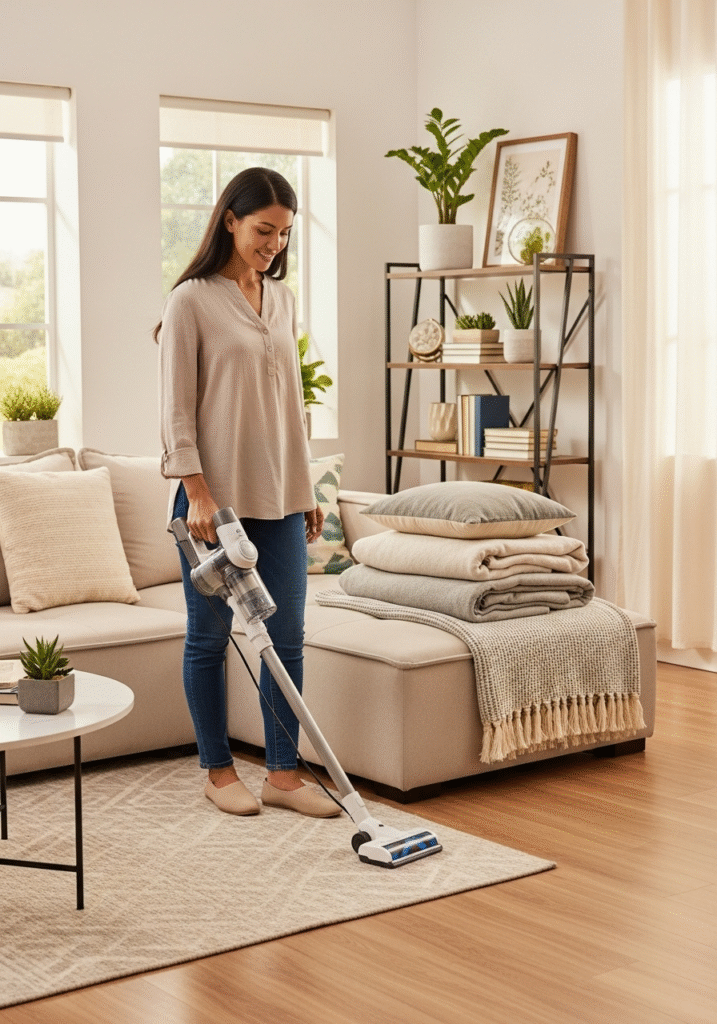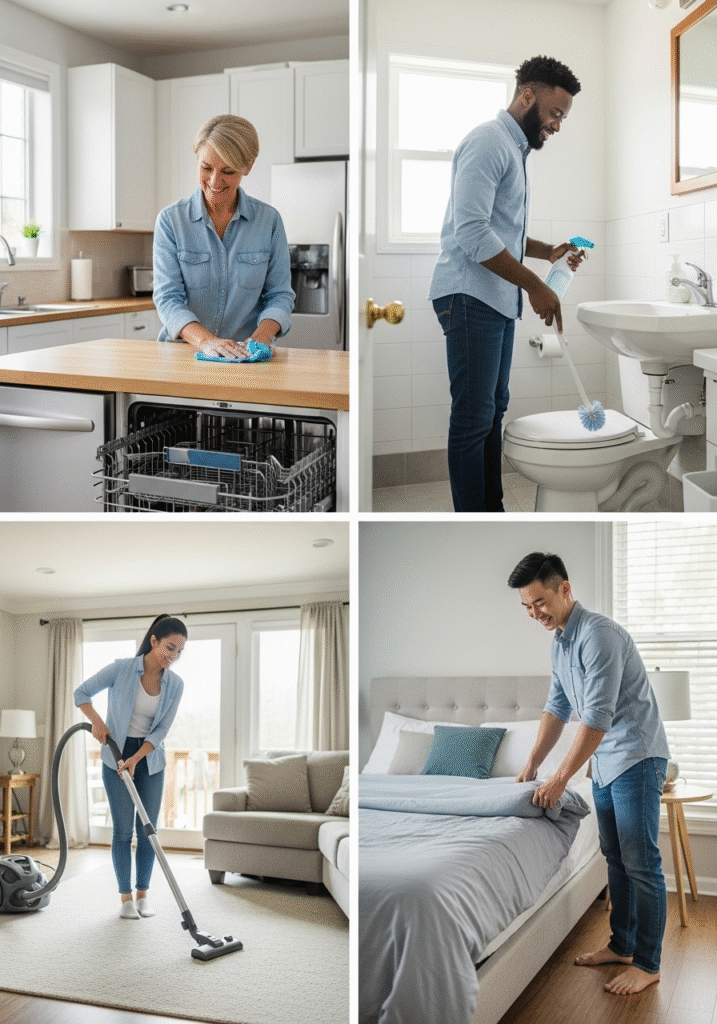Introduction
Maintaining a clean and organized home can often feel overwhelming, especially in today’s fast-paced world filled with endless responsibilities. Between work commitments, family obligations, and personal time, cleaning often falls to the bottom of the to-do list—only to resurface when the mess becomes too much to ignore. But what if keeping your home clean didn’t have to be so time-consuming or stressful? What if there was a simple, structured routine that allowed you to stay on top of housework without spending hours each week?
This blog post introduces you to a time-saving home cleaning routine that is practical, easy to implement, and designed for busy individuals and families. You’ll learn how to break down your cleaning tasks into manageable chunks, organize your week for maximum efficiency, and adopt habits that keep your home consistently tidy with minimal effort. From daily 15-minute cleanups to smart weekly and monthly schedules, this routine is all about working smarter—not harder.
Perfect for working professionals, parents, students, or anyone seeking more balance and less chaos at home, this routine is flexible enough to adapt to any lifestyle. It emphasizes consistency, efficiency, and simplicity—not perfection. Along the way, we’ll also share helpful tips, time-saving hacks, and tools that can make your cleaning efforts even more effective.
Say goodbye to overwhelming weekend chores and hello to a home that practically cleans itself. Whether you live in a studio apartment or a full-sized family home, this guide will empower you to reclaim your time while keeping your living space fresh, inviting, and under control. Let’s dive into the ultimate time-saving cleaning routine that will transform how you manage your home—one day at a time.

Why Time-Saving Cleaning Routines Matter
In our increasingly hectic lives, finding time to maintain a clean and organized home can feel like an uphill battle. Between demanding work schedules, family responsibilities, social commitments, and the ever-growing digital distractions, household chores often get pushed aside. The result? A cluttered, stressful environment that affects not just the appearance of your home—but your mental health, focus, and overall well-being.
A clean home is more than just a visual luxury—it’s a foundation for a balanced lifestyle. Research shows that tidy, organized living spaces can significantly improve mental clarity, reduce anxiety, and even boost your productivity and creativity. But when cleaning becomes too time-consuming or inconsistent, it leads to a build-up of stress, physical mess, and eventually, burnout. That’s where time-saving cleaning routines become essential.
Instead of spending hours on end tackling every corner of your home, a streamlined routine helps you clean smarter, not harder. With the right planning and consistency, you can reduce your total cleaning time by 30% to 50%, freeing up your day for things that matter most—family time, self-care, hobbies, or simply rest.
Time-saving routines work because they create structure and predictability. By incorporating small daily habits, weekly cleaning zones, and monthly deep-clean tasks, your chores become more manageable and far less overwhelming. You no longer feel the pressure to do everything all at once, and you eliminate the mental load that often comes with a cluttered space.
More importantly, these routines help prevent messes from accumulating in the first place. A few minutes of maintenance each day can stop clutter, dust, and grime from piling up. This not only keeps your home visually appealing but also promotes better indoor hygiene and air quality, which is especially beneficial for families with children, pets, or individuals with allergies.
The power of a time-saving routine lies in its sustainability. You’re not expected to clean like a perfectionist; you’re empowered to clean consistently. With the right strategies, tools, and mindset, anyone can maintain a home that feels peaceful and inviting—without sacrificing hours of their time.
Ultimately, adopting a time-saving cleaning routine is about investing in your quality of life. It’s about creating a home environment that supports your goals, your health, and your happiness—day in and day out.

Step 1: Declutter Before You Clean
Before you even think about picking up a broom or spraying down the countertops, there’s one crucial step that can dramatically reduce your cleaning time and mental fatigue: decluttering. Trying to clean around piles of paper, toys, clothing, or random household items only makes the process longer and more frustrating. Clutter not only blocks your physical space—it also clogs your mental clarity and motivation.
Think of decluttering as the gateway to efficient cleaning. When your home is free from unnecessary items and visual distractions, every cleaning task becomes faster, easier, and more effective. You’ll no longer waste time moving objects from one surface to another, and you’ll be able to clean more thoroughly in less time.
Decluttering doesn’t have to mean a weekend-long purge or a full-blown minimalist lifestyle. It’s about making small, consistent decisions that help you reclaim space and restore order in a manageable way. Here’s how to get started:
Tips for Effective Decluttering:
- Start small and focused: Tackling your entire home at once can feel overwhelming. Instead, choose one area—a single drawer, one shelf, or a corner of a room. Small wins add up to big progress.
- Use the “4-Box Method”: As you go through your items, sort them into four categories:
Keep (things you use and love),
Donate (items in good condition that no longer serve you),
Trash (broken or unusable items),
Relocate (things that belong in another part of the home). - Schedule short declutter sessions: You don’t need hours. Just 10–15 minutes a few times a week is enough to stay ahead of clutter and keep your space manageable.
- Let go of perfection: Don’t aim for a Pinterest-worthy home on day one. Focus on progress and function, not aesthetics. The goal is to make your space more livable and easier to maintain.
Decluttering is more than just tossing out old items—it’s an intentional act of creating room for the things that truly matter. It makes your home feel lighter, your mind feel clearer, and your cleaning routine significantly faster and more efficient.
Even better? The more consistently you declutter, the less time you’ll spend cleaning overall. Surfaces stay clearer, floors are easier to vacuum, and your home becomes more peaceful and inviting. Once you’ve cleared the clutter, you’ll be amazed at how much simpler and quicker your actual cleaning tasks become.
So before diving into dusting, sweeping, or scrubbing, take a few minutes to declutter. You’ll lay the foundation for a more effective and time-saving cleaning routine that lasts.

Step 2: Create a Weekly Cleaning Schedule
One of the most powerful ways to save time and reduce cleaning stress is to create a weekly cleaning schedule. Rather than cramming all your household chores into a single exhausting day—usually the weekend—breaking them into smaller, manageable tasks throughout the week can make the entire process feel lighter, more organized, and far less overwhelming.
A well-structured cleaning routine ensures that no area of your home is neglected, while also preventing burnout. When cleaning becomes a daily habit instead of a massive undertaking, it naturally integrates into your lifestyle and becomes second nature. You won’t have to dread Saturday mornings spent scrubbing every surface—because the work will already be spread out.
Creating your own personalized schedule can be as flexible or specific as you need it to be. The key is to match your cleaning routine with your energy levels, time availability, and household priorities. Here’s a simple sample weekly cleaning schedule to get you started:
Sample Weekly Cleaning Schedule
| Day | Task |
|---|---|
| Monday | Dust and wipe surfaces (furniture, windowsills, baseboards) |
| Tuesday | Vacuum and mop floors (focus on high-traffic areas) |
| Wednesday | Deep-clean the bathroom (toilet, sink, tub, mirrors) |
| Thursday | Kitchen cleaning (appliances, counters, cabinets, sink) |
| Friday | Laundry and linens (bedding, towels, clothing) |
| Saturday | Catch-up tasks or home organization (pantry, closets, paperwork) |
| Sunday | Rest day or reset for the upcoming week |
Why This Schedule Works:
- Reduces overwhelm: By doing just one or two tasks a day, cleaning feels less like a chore and more like a routine part of life.
- Builds consistency: Daily habits are easier to maintain than once-a-week marathons, which often get skipped when life gets busy.
- Keeps your home consistently clean: Because each area of the house is addressed weekly, no room is left neglected for too long.
- Fits any lifestyle: Whether you’re working full-time, parenting, studying, or all of the above, this routine can be tailored to your schedule.
You can modify this outline to suit your household’s specific needs. For instance, if you live alone in a small apartment, you might combine tasks or skip certain days. If you have a large family, you might delegate tasks among family members or add special cleaning projects like cleaning out the garage or washing windows.
The beauty of a weekly schedule is its flexibility and sustainability. It promotes a rhythm that helps you stay in control, rather than reacting to messes when they’ve already spiraled out of control. Over time, you’ll likely find that your home stays cleaner with less effort—and that you enjoy a greater sense of calm and order in your everyday environment.
Incorporating a weekly cleaning plan into your life is not about being perfect—it’s about being intentional. With just 20–30 minutes a day, you can maintain a home that feels clean, functional, and welcoming all week long, without ever feeling like cleaning is taking over your life.

Step 3: Use the Right Tools and Products
When it comes to saving time during your cleaning routine, the tools you use matter just as much as the methods you follow. Investing in the right cleaning products and tools can make your efforts more effective, reduce the physical strain of cleaning, and drastically cut down the time it takes to tidy up your home.
Think of cleaning like cooking: the right equipment makes the job easier, faster, and more enjoyable. Outdated or inefficient tools can make even the simplest tasks feel like a chore, while modern, thoughtfully chosen supplies help you tackle dirt and grime with speed and confidence.
Here are some essential, time-saving cleaning tools and products every home should have:
Time-Saving Essentials for Efficient Cleaning
- Multi-Surface Cleaners:
Instead of switching between five different bottles for counters, glass, wood, and tile, a good multi-surface cleaner simplifies your supply list. It’s ideal for kitchens, bathrooms, and general daily wipe-downs—saving you time and reducing clutter under the sink. - Microfiber Cloths:
These reusable cloths are a game-changer. Microfiber attracts dust, dirt, and bacteria more effectively than cotton or paper towels—and they do it without the need for harsh chemicals. Use them for windows, mirrors, appliances, and general surface cleaning. Plus, they’re washable and eco-friendly. - Cordless Vacuum Cleaner:
Say goodbye to tripping over cords or dragging around a heavy machine. A lightweight cordless vacuum allows you to clean floors, rugs, and even furniture quickly and easily. Many models offer attachments for tight corners, stairs, and upholstery, making them versatile time-savers. - Scrubbing Brushes with Handles:
Scrubbing on your hands and knees is time-consuming and hard on your body. A brush with a long handle allows you to deep-clean tubs, tile grout, and even floors without unnecessary strain. Look for brushes with ergonomic grips and interchangeable heads for added convenience. - Spray Mops:
Perfect for daily or mid-week floor maintenance, spray mops let you clean up spills and dirt without hauling out a bucket. Just fill the reservoir with your favorite cleaner (or a simple vinegar-water mix), spray, and mop—it’s that easy.
Bonus Tip: Use a Cleaning Caddy
Efficiency is all about reducing unnecessary steps. Keeping all your essential supplies in a portable cleaning caddy means no more running from room to room searching for glass cleaner or extra rags. With everything in one place, you can move quickly from task to task, making the most of even short cleaning sessions.
Why the Right Tools Matter
- Save time on every task: The right product can reduce scrubbing time, minimize passes, and eliminate extra steps.
- Reduce stress and fatigue: Ergonomic, lightweight tools are easier on your body and encourage more frequent use.
- Improve results: Quality tools clean more thoroughly and effectively, often in less time.
- Boost motivation: When cleaning feels easy and fast, it’s much more likely to become a habit instead of a burden.
By equipping your home with the right tools and keeping them easily accessible, you set yourself up for success. Cleaning no longer feels like a dreaded, energy-sapping task—instead, it becomes a streamlined part of your day that supports your overall comfort and well-being.
Remember, you don’t need a closet full of products. A few reliable, multi-use items can go a long way in helping you maintain a spotless home with minimal effort. Clean smart, not hard—and let your tools do the heavy lifting.

Step 4: Clean Room by Room (Daily Focus Areas)
Cleaning your entire home in one go can feel overwhelming—even impossible—especially when your time and energy are limited. That’s why breaking your routine down room by room is a highly effective strategy. It not only makes cleaning feel more manageable but also helps you maintain a consistently tidy environment without burning out.
The room-by-room approach allows you to zero in on one space at a time, ensuring that nothing gets overlooked while spreading out your efforts throughout the week. By assigning simple, quick tasks to each area of the home, you’re creating a daily rhythm that keeps messes from piling up and prevents that all-too-familiar feeling of cleaning fatigue.
Here’s how to tackle each area of the home with targeted, time-saving habits you can easily build into your daily routine:
Kitchen – Clean as You Go
The kitchen is the heart of the home—and also one of the quickest to get messy. Food prep, spills, dishes, and daily traffic all contribute to ongoing clutter and grime. Staying on top of it each day prevents buildup and makes deep cleaning less frequent.
Daily Kitchen Tasks:
- Wipe countertops and stove surfaces after meals to prevent sticky messes and stains.
- Clean as you cook by rinsing utensils, putting away ingredients, and loading dishes into the dishwasher during prep.
- Empty the dishwasher before bed to ensure you wake up to a clean slate each morning—ready for a new day.
Bathroom – Stay Ahead of Grime
Bathrooms can get grimy fast if left unchecked. Daily maintenance prevents the need for intensive scrubbing later on and keeps this high-use space fresh and sanitary.
Daily Bathroom Tasks:
- Spray down the sink, faucet, and shower walls after use with a quick-dry cleaner or DIY solution.
- Use a toilet wand with disposable heads for easy, touch-free bowl cleaning.
- Keep disinfecting wipes handy for quick touch-ups on countertops, toilet seats, and doorknobs.
These micro-tasks take just a couple of minutes but dramatically reduce the need for frequent deep cleans.
Living Room – Reset the Space Daily
As the central gathering space, the living room often attracts clutter—remote controls, mail, toys, and more. A simple daily reset keeps it feeling welcoming and organized.
Daily Living Room Tasks:
- Declutter surfaces every evening—remove cups, wrappers, papers, or items that belong elsewhere.
- Vacuum high-traffic areas (like rugs and walkways) twice a week to reduce dust and allergens.
- Fluff pillows, fold blankets, and realign furniture as needed for a fresh, orderly look.
Bedrooms – Begin and End with Calm
A tidy bedroom promotes better sleep, reduces stress, and sets the tone for your entire day. Keeping your bedroom clean doesn’t have to be time-consuming—just intentional.
Daily Bedroom Tasks:
- Make the bed every morning. It’s a small win that makes a big visual impact and encourages tidiness throughout the day.
- Do a quick 5-minute tidy-up each night. Pick up clothes, reset your nightstand, and straighten anything out of place.
Even these small acts can help transform your bedroom into a personal sanctuary.
Why the Room-by-Room Approach Works
- Creates focus: Instead of feeling pulled in every direction, you can concentrate on one area and do it well.
- Saves energy: Cleaning a single room at a time is less tiring and more motivating than tackling your entire home.
- Builds momentum: Daily mini-tasks build into a consistent routine that feels manageable and satisfying.
- Fits any lifestyle: Whether you have five minutes or thirty, focused cleaning ensures progress with minimal stress.

Step 5: Use the “Two-Minute Rule” for Quick Wins
One of the biggest reasons people struggle to keep their homes clean is procrastination. It’s easy to put off little chores, thinking they’re not urgent—but over time, those small tasks snowball into overwhelming messes. That’s where the “Two-Minute Rule” comes in—a simple yet powerful time-management technique that can revolutionize the way you clean.
Originally introduced by productivity expert David Allen in his book Getting Things Done, the rule is simple:
“If a task takes less than two minutes to complete, do it immediately.”
When applied to home cleaning, this mindset shift helps you stay on top of minor messes before they turn into major headaches. Instead of letting dishes pile up, laundry scatter across the floor, or clutter collect on counters, you take quick, purposeful action in the moment—eliminating mess before it has a chance to grow.
Why the Two-Minute Rule Works
- Eliminates decision fatigue: You don’t need to wonder whether a task is “worth doing now”—if it’s quick, you just do it.
- Builds momentum: Small wins create a feeling of accomplishment, which boosts motivation for bigger tasks.
- Prevents buildup: When you knock out micro-tasks consistently, deep cleaning sessions become shorter and less daunting.
- Fits any lifestyle: Whether you’re working full-time, parenting, or constantly on the move, you can always spare two minutes.
Examples of Two-Minute Cleaning Tasks
These are the small but powerful actions that can keep your home clean and stress-free:
- Wiping down a bathroom or kitchen counter after use
- Putting shoes in the closet or on a rack instead of leaving them by the door
- Tossing dirty laundry into a hamper
- Folding and putting away a few clean items of clothing
- Emptying a small trash bin
- Straightening pillows and throws on the couch
- Loading a few dishes into the dishwasher
- Quickly dusting a coffee table or shelf with a microfiber cloth
- Picking up toys or pet items from the floor
Individually, these tasks seem trivial. But collectively, they have a significant impact on how clean and organized your home feels throughout the day.
Make It a Habit, Not a Chore
The power of the Two-Minute Rule lies in its simplicity and consistency. By making quick actions second nature, you create a home that practically cleans itself in real-time—because you’re constantly maintaining it with minimal effort.
Here’s how to build it into your routine:
- Start noticing opportunities. The moment you walk into a room, look for something that can be done in under two minutes.
- Anchor the habit. Attach it to something you already do—like doing a quick tidy while waiting for your coffee to brew or wiping the bathroom mirror after brushing your teeth.
- Use visual cues. Leave a microfiber cloth in each room or a small basket for stray items to make quick cleaning even easier.
From Quick Tasks to a Cleaner Life
While major cleaning tasks require time and planning, it’s the tiny, consistent efforts that keep your home looking tidy and inviting day after day. The Two-Minute Rule empowers you to take back control over clutter and mess in an effortless way.
By dealing with things immediately, you reduce the mental load of remembering what needs to be done and eliminate the stress of “catching up” later. Over time, these small habits form the backbone of a home that feels calm, clean, and manageable—without dedicating entire hours to cleaning every day.
So next time you see something that needs to be done, ask yourself:
“Can I finish this in under two minutes?”
If yes, do it now—and watch how your home (and peace of mind) transforms.

Step 6: Nightly Reset Routine
One of the simplest yet most powerful ways to maintain a clean and organized home is by implementing a nightly reset routine. This short, intentional ritual helps you tie up the loose ends of the day and prepare for a smooth, stress-free tomorrow. It’s not about deep cleaning—it’s about doing just enough to reset your space and your mindset.
In just 10 to 15 minutes each evening, you can prevent clutter from piling up, reduce morning chaos, and create a sense of calm that carries into the next day. This routine acts as a daily reset button for your home, turning small efforts into long-term cleanliness and peace of mind.
Why a Nightly Reset Routine Matters
- Prevents mess from snowballing: A little nightly effort keeps your home from falling into disarray during the week.
- Reduces morning stress: Waking up to a clean kitchen and tidy living space helps you start the day with clarity and intention.
- Builds momentum: When your environment is clean, you feel more motivated to maintain that standard throughout the day.
- Promotes restful sleep: A clutter-free space allows your brain to relax, improving sleep quality and mental well-being.
Nightly Reset Checklist: Simple Tasks, Big Impact
Here’s a practical list of quick, high-impact tasks that can be part of your nightly home reset routine:
1. Put Items Back in Place
Take a quick walk through high-traffic areas (living room, entryway, kitchen) and return anything that’s out of place—shoes, bags, toys, mail, etc. This prevents clutter from spreading and saves you from feeling overwhelmed later.
2. Wipe Down Kitchen Counters
A quick wipe with a microfiber cloth and multi-surface spray removes food crumbs, spills, and grease. Doing this nightly prevents buildup and keeps your kitchen looking fresh and sanitary.
3. Run the Dishwasher or Hand-Wash Dishes
Don’t leave dirty dishes overnight. Running the dishwasher or washing that last plate or pan ensures your sink is empty in the morning, creating a cleaner and more welcoming kitchen space.
4. Take Out the Trash (If Full)
If your trash bin is nearing capacity—or starting to smell—take it out before bed. This not only helps with hygiene but also prevents odors from lingering into the next day.
5. Prep for the Next Day
A little planning at night saves time in the morning. Lay out clothes, prep breakfast or lunch items, check your to-do list, or pack your work/school bag. These simple steps make mornings smoother and more organized.
The Routine Takes Just 10–15 Minutes
You don’t need to spend hours cleaning at night. By consistently following this brief checklist, you’ll eliminate the need for frantic cleaning sessions or stressful weekend catch-ups. Even better, you’ll go to sleep knowing your space is in order and your morning will start with calm instead of chaos.
Try setting a timer if you’re new to the habit—it can help you stay focused and efficient. Better yet, involve your family or housemates so that everyone pitches in and the work is shared.
Your Home Deserves a Peaceful Ending
A nightly reset is about more than just tidying up—it’s an act of self-care. It’s a way to close the chapter on your day with intention, order, and clarity. Whether you’re a parent, a professional, or a busy student, these small actions can create a ripple effect of positivity throughout your life.
Imagine waking up each morning to a clean sink, clutter-free surfaces, and a sense of control. That peace of mind starts the night before—with a simple habit that takes less time than scrolling through your phone.

Bonus Tips for Working Parents and Busy Individuals
Life is busy. Between work, school runs, meals, appointments, and everything in between, keeping your home clean can feel like an added stressor instead of a manageable task. But the truth is, you don’t have to sacrifice a clean home just because your schedule is packed.
These bonus cleaning tips are tailored specifically for working parents, professionals, caregivers, and anyone who feels like there just aren’t enough hours in the day. The goal isn’t perfection—it’s practicality. These time-efficient, flexible strategies are designed to work with your lifestyle, not against it.
1. Involve the Whole Family
You don’t have to clean alone. In fact, one of the most effective ways to manage home care while working full-time is to turn cleaning into a family affair. Kids as young as three can start learning basic chores, and partners can take on shared responsibilities.
Tips for Family Involvement:
- Assign age-appropriate chores to children (e.g., putting away toys, feeding pets, dusting low surfaces).
- Use a chore chart or rotating schedule to distribute tasks fairly.
- Turn chores into family challenges or games (e.g., who can pick up the most toys in 2 minutes?).
- Encourage a sense of ownership and pride in keeping shared spaces clean.
Not only does this reduce your workload, but it also teaches responsibility and teamwork.
2. Use Timers for Motivation and Focus
When time is tight, it’s easy to either rush through tasks or procrastinate. A simple trick? Use a timer. Setting a 10- or 15-minute timer helps you stay focused, limit distractions, and turn cleaning into a game.
Timer Techniques to Try:
- Power clean for 10 minutes before dinner or bed.
- Set a “beat the clock” challenge—see how much you can do before the timer rings.
- Use transitional time (like waiting for laundry to finish) to tackle a short cleaning task.
Timers create urgency, fun, and structure—especially helpful for kids or anyone who finds cleaning tedious.
3. Multitask Wisely
When you’re balancing work, family, and life, multitasking becomes second nature. Apply that mindset to cleaning! By combining light cleaning tasks with other enjoyable activities, you make housework feel less like a chore.
Smart Multitasking Ideas:
- Fold laundry while watching TV or catching up on shows.
- Listen to audiobooks or podcasts while vacuuming, mopping, or organizing.
- Tidy up while on a phone call using earbuds or speaker mode.
- Do a quick surface wipe during microwave or oven preheats.
This approach turns mundane tasks into background activities that don’t feel like time wasted.
4. Automate Wherever Possible
In today’s tech-savvy world, automation can be your secret weapon for home maintenance. Small appliances and digital reminders can save hours over time, especially if you’re balancing a full household and career.
Automation Ideas:
- Use a robotic vacuum to clean floors while you sleep or work.
- Set your dishwasher to run overnight and unload it in the morning.
- Enable laundry reminders on your phone or smart speaker so you don’t forget a load.
- Create recurring tasks in apps like Todoist, Google Calendar, or Cozi for routine cleaning.
You don’t have to do it all manually—let technology take some of the burden off your plate.
5. Don’t Aim for Perfection—Aim for “Clean Enough”
One of the biggest obstacles busy people face is the pressure to meet unrealistic standards. The truth? A perfectly clean home isn’t necessary every day. What matters more is consistency and comfort.
What “Clean Enough” Looks Like:
- Dishes are done (or in the dishwasher), not necessarily every surface scrubbed.
- Floors are swept weekly, even if not mopped daily.
- Clutter is under control—even if a few toys or clothes are out.
- Bedrooms are livable—not showroom-ready.
Give yourself permission to let go of perfection. Prioritize progress and peace of mind over spotless results. Deep clean monthly, not daily. Your home should serve your life—not the other way around.
Make It Work for You
No two households are the same. What works for a single parent may differ from what works for a couple with teenagers or a young professional living alone. The key is to find a routine that aligns with your time, energy, and goals.
- Choose the tips that fit naturally into your current lifestyle.
- Don’t be afraid to adjust routines seasonally or based on your family’s changing needs.
- Most importantly, celebrate the effort—not just the results.

Conclusion
Keeping a home clean shouldn’t feel like a second job. In today’s fast-paced world, where work, family, and personal priorities often pull you in a dozen directions, a time-saving home cleaning routine isn’t just helpful—it’s essential. But let’s be clear: this isn’t about doing more cleaning; it’s about doing it smarter, faster, and more sustainably.
By embracing a few simple yet strategic habits—like decluttering before you clean, breaking up tasks by day and room, using the right tools, and leveraging time-saving tactics like the “Two-Minute Rule” and nightly resets—you can maintain a clean, comfortable home without exhausting yourself.
Efficiency Over Perfection
Perfection is not the goal here. Life happens. Homes get messy. What matters most is creating a realistic and repeatable routine that fits your lifestyle—whether you’re a busy parent juggling carpools and conference calls, or a solo professional trying to maintain balance in a hectic week.
A clean enough home is better than a never-finished one. Aim for consistency over flawlessness. Doing a little each day prevents the mess from spiraling and eliminates the need for marathon weekend cleaning sessions.
The Benefits Go Beyond Clean Floors
An efficient home cleaning routine doesn’t just make your space look better—it makes you feel better. Studies show that a tidy home can improve mood, reduce stress, boost productivity, and even contribute to healthier habits. The clarity that comes from a clean, organized space frees your mind to focus on the things that truly matter: your family, your work, your passions, and your well-being.
You deserve a home that supports your life, not one that adds to your mental load.
Reclaim Your Time and Energy
By investing just a few minutes each day and following a thoughtful plan, you can reclaim hours each week that might otherwise be lost to disorganized or last-minute cleaning. Instead of catching up on chores, you can spend your evenings and weekends enjoying your space, your family, or even a moment of well-earned rest.
Whether you’re cleaning solo or with a team, the right routine empowers you to take control—not just of your home, but of your time.
Start Today—Build the Habit, Enjoy the Results
Remember, the hardest part is often just getting started. Pick one step from the routine—maybe it’s the nightly reset, or assigning family chores—and build from there. You don’t have to overhaul your life overnight. Small, consistent actions lead to lasting, sustainable results.
With the right mindset and approach, cleaning doesn’t have to feel like a burden—it can be a life-enhancing habit that brings clarity, calm, and confidence into your everyday routine.
Final Thought
A tidy, well-maintained home isn’t just a reflection of order—it’s a foundation for peace of mind, better health, and a happier life. When you adopt a time-saving cleaning routine that works for you, you’re not just cleaning your space—you’re creating the freedom to live more fully.
So go ahead: Clean smart. Live well. And enjoy the peace that comes from a home that takes care of itself—because you’ve built the routine to make it happen.

